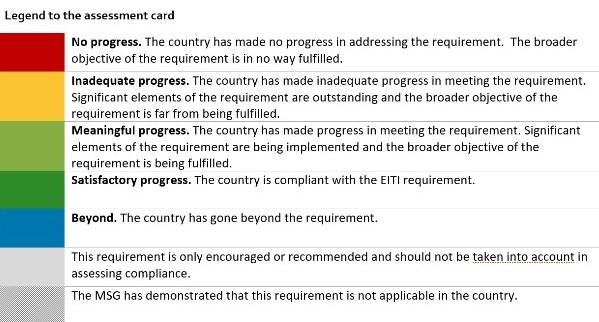
Cameroon recognised as making meaningful progress against the EITI Standard
Cameroon recognised as making meaningful progress against the EITI Standard
The EITI Board congratulated Cameroon on its achievement, noting that the EITI has brought valuable information to the public domain, including through publications of its national oil company, SNH.
29 June 2018 – The EITI Board declared today that Cameroon has demonstrated meaningful progress in implementing the EITI Standard. In making its decision, the Board took note of Cameroon’s efforts to improving transparency and accountability in the extractive industries by providing a trusted source of data to inform public debate. The Board also welcomed the EITI’s impact in gradually enticing government agencies towards routine disclosures, evidenced by more regular publications by the national oil company, the Société Nationale des Hydrocarbures (SNH), including disclosure of oil sales.
According to the Validation report, EITI reporting has generated debate on subnational transfers, production, mining-licenses and artisanal and small-scale mining. Increasing interest in the EITI process from university students presents the potential to further improve the public understanding of extractive issues. EITI implementation has driven reform in the mining sector, including in the adoption of beneficial ownership disclosure provisions in the new Mining Code, and gone beyond minimum EITI Requirements in reporting companies’ voluntary social payments.
Following the announcement of the decision, Fredrik Reinfeldt, Chair of the EITI, said:
“EITI implementation has yielded tangible results, ensuring that data about the hydrocarbons and mining sectors contribute to wider reforms. We also congratulate Cameroon as a key actor in pioneering efforts to improve reporting on commodity trading.”
Agnès Solange Ondigui Owona, National Coordinator of EITI Cameroon, said:
"This evaluation, for the period going from October 18, 2013 to July 1st, 2017, reflects the work undertaken by Cameroon with respect to EITI's Standard. The precedent evaluation was done following EITI's Rules. It also encourages them to proceed to the implementation of the requirements, especially regarding those that have been recommended by the Validator and on which EITI´s Cameroun Committee has already begun working."
Recommendations
The Board noted that the EITI in Cameroon had gone beyond the minimum required by the EITI Standard in disclosing export data (3.3) and voluntary social expenditures (6.1). The Board outlined 14 corrective actions that Cameroon will have to address in the coming 18 months, i.e. until (date of Board decision + 18 months), when progress will be re-assessed. Validation highlighted opportunities to improve EITI implementation on civil society engagement (1.3), MSG governance (1.4), the work plan (1.5), license register (2.3), policy on contract transparency (2.4), state-participation (2.6), production data (3.2), in-kind revenues (4.2), SOE transactions (4.5), distribution of revenues (5.1), subnational transfers (5.2), SOE quasi-fiscal expenditures (6.2), public debate (7.1) and documentation of impact (7.4).
Scorecard

Notes
- Validation is the EITI’s independent evaluation mechanism. It assesses countries against progress made in meeting the 2016 Standard.
- See here for a full explanation of the various levels of progress under the EITI Standard.
- See the interactive scorecard for Cameroon here.
- The decision in full: 2018-32/BM-40/BP-40-6-A
- The documentation of Cameroon's Validation can be found here.
- For further information about the EITI in Cameroon, please visit the country page on the EITI website.
Related content






